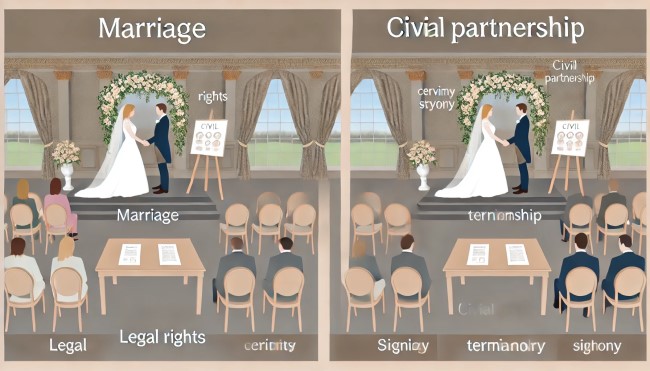Difference Between Civil Partnership and Marriage: Exploring Key Legal and Social Distinctions

In recent years, civil partnerships and marriages have emerged as legally recognized commitments, each offering unique benefits, rights, and societal roles. Whether you’re contemplating entering into one of these unions or simply seeking to understand their nuances, knowing the difference between a civil partnership and marriage is essential. Here, we break down the characteristics, legal standing, and cultural implications of each to help you make a more informed choice.
Understanding the Legal Frameworks of Civil Partnerships and Marriage
Both civil partnerships and marriages allow couples to formalize their relationships with legal protection and responsibilities. While they share similarities, each structure has distinct elements regarding formation, ceremony, legal rights, and even terminology. Here’s an in-depth comparison to shed light on the differences between these two types of unions.
-
What Is a Civil Partnership?
A civil partnership is a legally recognized union between two people, offering similar rights and responsibilities as a marriage. It was initially introduced to provide a legally binding relationship for same-sex couples before same-sex marriage was legalized. Today, civil partnerships are open to both same-sex and opposite-sex couples, allowing a formal recognition of commitment without necessarily adhering to traditional marriage norms.
- Key Features:
- Civil partnerships do not require a religious or ceremonial component.
- They are formalized by signing a civil partnership document.
- Civil partnerships offer legal rights comparable to marriage, including tax benefits, inheritance, and parental rights.
What Is a Marriage?
Marriage is one of the oldest forms of union, recognized across various cultures and religions worldwide. In legal terms, marriage is a binding contract that gives couples specific rights and responsibilities. It typically involves a religious, secular, or civil ceremony celebrating two people’s commitment.
- Key Features:
- It often includes a ceremonial event where vows are exchanged.
- Recognized in both religious and civil frameworks.
- Internationally recognized, offering more consistency in rights across jurisdictions compared to civil partnerships.
Key Differences Between Civil Partnership and Marriage
Formation and Ceremony Requirements
- Marriage:
- It can be a religious or civil ceremony.
- It involves an exchange of vows, often witnessed by family and friends.
- Formalized by signing a marriage certificate, which may be conducted in various ceremonial settings.
- Civil Partnership:
- Lacks the need for a religious ceremony or any formal vows.
- Primarily involves signing a legal document in front of witnesses.
- No specific celebratory or religious connotations are attached, making it more neutral and secular.
Legal Terminology
The terminology differs significantly between the two forms of union:
- Marriage:
- Couples are referred to as “husband” and “wife,” or simply as “spouses.”
- “marriage” is recognized internationally, providing more consistent legal acknowledgment.
- Civil Partnership:
- Partners are referred to as “civil partners.”
- The term “civil partnership” is less commonly recognized outside specific jurisdictions, which may impact legal status when traveling abroad.
Dissolution Process
Dissolving a civil partnership differs from a marriage divorce:
- Marriage:
- A marriage can be ended through a divorce process, typically requiring grounds like irreconcilable differences, separation, or adultery.
- A decree absolute finalizes the divorce, entirely dissolving the union.
- Civil Partnership:
- It ended through a dissolution order.
- While similar to divorce, adultery is not considered a valid ground for ending a civil partnership, a difference rooted in the partnership’s more secular foundation.
Religious Recognition and Cultural Perceptions
- Marriage:
- Holds vital cultural and religious significance in many societies.
- It is often viewed as a traditional or even sacred union.
- We are recognized within religious institutions, often with substantial ceremony and celebration.
- Civil Partnership:
- Secular and legally driven, without religious connotations.
- Appeals to those who may prefer a legally binding commitment without religious or cultural obligations.
- It is viewed as a modern alternative for those who value legal protection without the cultural weight of marriage.
International Recognition and Implications
One of the significant distinctions comes in terms of recognition:
- Marriage:
- It is widely recognized internationally, with more consistent rights for spouses across different countries. However, recognition for same-sex marriages may vary by country.
- Legal standing for marriage often simplifies tax, inheritance, and residency matters abroad.
- Civil Partnership:
- Recognition varies significantly by jurisdiction, creating challenges for couples living or traveling abroad.
- Some countries may need to acknowledge civil partnerships, leading to legal inconsistencies in inheritance rights, taxation, and parental status.
Which Option Is Right for You?
Deciding between a civil partnership and a marriage depends on individual values, legal needs, and personal preferences. Here’s a quick overview of the factors that may influence your choice:
- Opt for Marriage If:
- You value the traditional, ceremonial, or religious aspects of marriage.
- You are seeking an internationally recognized status with a consistent legal standing.
- You prefer using terms like “spouse” or “husband/wife.”
- Opt for Civil Partnership If:
- You prefer a secular, straightforward process without religious or ceremonial requirements.
- You want legal recognition without the cultural connotations of marriage.
- You value a modern alternative that provides similar rights but aligns more with secular views.
Final Thoughts: Making an Informed Decision
The difference between civil partnership and marriage is more than a matter of labels; it’s about choosing the legal structure that best fits your relationship and lifestyle. Whether you prioritize religious recognition, legal rights, or a secular approach, both union forms offer substantial protections for committed couples. Assess your needs, values, and future goals to make the most informed choice, ensuring that whatever path you take reflects your personal and legal priorities.
In conclusion, understanding the difference between marriage and a civil partnership is crucial, as it empowers you to select the best legal and cultural fit for your relationship. Whether you opt for marriage or a civil partnership, your commitment remains a significant personal journey, safeguarded by the law in ways that align with your beliefs and aspirations.


